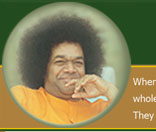| |
Once Sage Valmiki asked Narada, "At the present time, is there a man who is full of virtues, possessed of heroic prowess, who knows the principles of righteousness, who is aware of the service rendered to Him and is grateful for the same, who is truthful in speech, who adheres to His resolutions without being agitated, who is established in moral conduct, who is friendly to all beings, who is full of knowledge, who is capable of undertaking any task, whose form is pleasing to all who see Him, who has subdued His senses and is conscious of His Atmic reality, who has conquered anger, who is endowed with spiritual splendour, who is free from envy and fault-finding, who causes even the gods to dread His fury when he is provoked into battle?" The question apparently is about a man, a Nara, but, all the traits are found only in God! Narada responds in the same language.
He says, "I shall tell you of a man (Nara) who has all these qualities. He is born in the Ikshvaku line as the son of Dasaratha, as the promoter of the joy of Kausalya. He then gives Valmiki a short resume of the story of Rama. Thus, Rama is introduced as a Nara, and seldom in the Ramayana is He explicitly spoken of as God. Rama himself declares "Aatmaanam maanusham manye, Ramam Dasarathaathmajam" "Know that I am a man, Rama the son of Dasaratha."
This play-acting by God as man, of Narayana as Nara is based on the very need that brought about the advent of Rama. Brahma who led the gods to the seat of Vishnu prayed that he should incarnate himself as man, because Ravana, the Rakshasa leader who by His ascetic achievements and spiritual loot had kept the Sun and Moon in bondage, the Five Elements in dread of His displeasure and all morality at bay, could be killed only by a man! |
|
"He prayed, let me prove incapable of being killed by the Gandharvas, the Yakshas, the devatas or the gods, and the rakshashas. I uttered the words, "So be it." Therefore, Ravana has become so proud and overbearing; he is casting off all respect for virtue and spiritual attainments. But, there is one method of destroying Him and one only. For, He did not mention human being in that list, because he was full of contempt for them. Therefore, Ravana is capable of being killed by a man, and only by a man. Otherwise, there is no death for Him!"
The curse that was pronounced by Gouthama on his unfaithful spouse, Ahalya was: "You will reside here for many thousands of years, without food, living on air alone, lying on ashes, full of remorse, unperceived by all created beings." Nirahara, means as used in the Bhagavad-Gita, "without any of the senses being fed with what they crave for" and the Gita says that those who follow that discipline, will be rid of even the least trace of desire, only when "they see Paramatma."—"Paramdrshtwaa." (II-59)
So, whom must Ahalya see for her Nirahara discipline to bear fruit? Let Gouthama who dictated the discipline, give the Answer.
When Rama, the son of Dasaratha comes into this dread forest, you will be rendered pure. So, Rama is the Param. That is the self-evident. But, what does Rama do, when Ahalya is freed from the curse and became visible? Since she is a holy Rishipatni, he "bowed to her feet in great joy" and she in turn, remembering Gauthama's words, offered Padyam, Argyam, etc., according to the tradition of hospitality. Thus the play-acting is continued throughout the entire Ramayana, God as man, man as God. |








